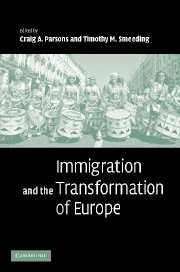Book contents
- Frontmatter
- Contents
- List of figures
- List of tables
- List of contributors
- Acknowledgements
- 1 What's unique about immigration in Europe?
- 2 Europe's immigration challenge in demographic perspective
- 3 Migration into OECD countries 1990–2000
- 4 Divergent patterns in immigrant earnings across European destinations
- 5 Economic consequences of immigration in Europe
- 6 Occupational status of immigrants in cross-national perspective: A multilevel analysis of seventeen Western societies
- 7 Immigrants, unemployment, and Europe's varying welfare regimes
- 8 How different are immigrants? A cross-country and cross-survey analysis of educational achievement
- 9 Immigration, education, and the Turkish second generation in five European nations: A comparative study
- 10 Managing transnational Islam: Muslims and the state in Western Europe
- 11 Migration mobility in European diasporic space
- 12 The new migratory Europe: Towards a proactive immigration policy?
- 13 European immigration in the people's court
- 14 The politics of immigration in France, Britain, and the United States: A transatlantic comparison
- 15 “Useful” Gastarbeiter, burdensome asylum seekers, and the second wave of welfare retrenchment: Exploring the nexus between migration and the welfare state
- 16 The European Union dimension: Supranational integration, free movement of persons, and immigration politics
- 17 The effectiveness of governments’ attempts to control unwanted migration
- Index
- References
8 - How different are immigrants? A cross-country and cross-survey analysis of educational achievement
Published online by Cambridge University Press: 23 June 2009
- Frontmatter
- Contents
- List of figures
- List of tables
- List of contributors
- Acknowledgements
- 1 What's unique about immigration in Europe?
- 2 Europe's immigration challenge in demographic perspective
- 3 Migration into OECD countries 1990–2000
- 4 Divergent patterns in immigrant earnings across European destinations
- 5 Economic consequences of immigration in Europe
- 6 Occupational status of immigrants in cross-national perspective: A multilevel analysis of seventeen Western societies
- 7 Immigrants, unemployment, and Europe's varying welfare regimes
- 8 How different are immigrants? A cross-country and cross-survey analysis of educational achievement
- 9 Immigration, education, and the Turkish second generation in five European nations: A comparative study
- 10 Managing transnational Islam: Muslims and the state in Western Europe
- 11 Migration mobility in European diasporic space
- 12 The new migratory Europe: Towards a proactive immigration policy?
- 13 European immigration in the people's court
- 14 The politics of immigration in France, Britain, and the United States: A transatlantic comparison
- 15 “Useful” Gastarbeiter, burdensome asylum seekers, and the second wave of welfare retrenchment: Exploring the nexus between migration and the welfare state
- 16 The European Union dimension: Supranational integration, free movement of persons, and immigration politics
- 17 The effectiveness of governments’ attempts to control unwanted migration
- Index
- References
Summary
Introduction
Migration plays an important and growing role in contributing to the population growth in most OECD (Organization for Economic Cooperation and Development) countries (see editors' introduction and chapter 1 in this volume). This chapter looks at an under-examined and crucial factor for immigrants' successful integration into the labour market and society: their education.
The first aim of this chapter is to analyze how immigrants differ from natives regarding educational outcomes and its determinants. Ten countries with a share of the foreign-born in the total population similar or greater than 10 percent (SOPEMI 2004) are examined: Australia, Canada, France, Germany, The Netherlands, New Zealand, Sweden, Switzerland, the United Kingdom, and the United States.
Literature investigating educational disadvantages of immigrants focus generally on educational attainment data that capture progression up national educational systems (e.g. van Ours and Veenman 2003; Riphahn 2003; and Crul, chapter 9 in this volume). This chapter examines educational achievement data that refer to educational outcomes like ability or ‘functional literacy’ (the ability to function in modern society). Educational achievement can be compared more easily across countries than educational attainment. First, educational attainment partly reflects countries’ institutional differences in how education is organized. Second, the educational attainment data of immigrants collected by different countries are not directly comparable, since the definition of what an immigrant is often differs between countries. It is also notable that a specific degree used as a measure of educational attainment might mirror different ability for immigrants and natives even in the same country.
- Type
- Chapter
- Information
- Immigration and the Transformation of Europe , pp. 200 - 234Publisher: Cambridge University PressPrint publication year: 2006
References
- 15
- Cited by



